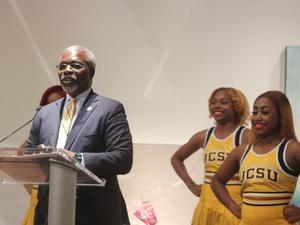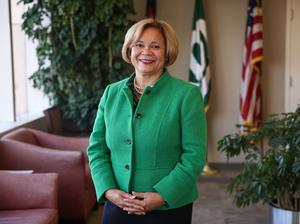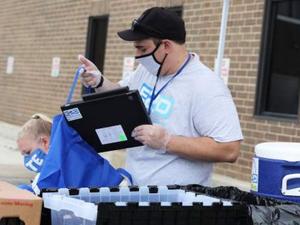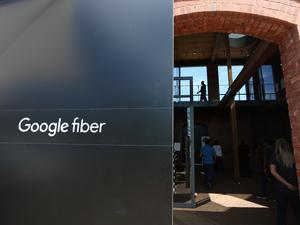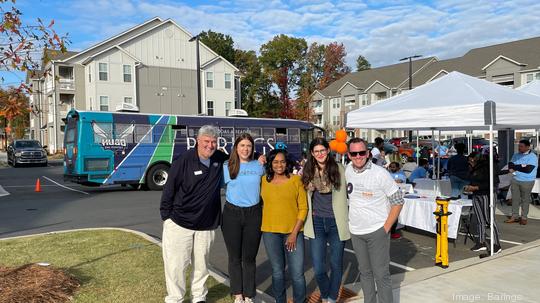
Several local organizations joined forces last week for one common cause — to help abolish the digital divide in underrepresented communities.
About 156 laptops were distributed on Oct. 27 to residents at Evoke Living Apartments at Westerly Hills in Charlotte. That community, along with 10 others, is funded under the Charlotte Housing Opportunity Investment Fund — an initiative that launched in 2019 to create and preserve affordable housing in the city.
The Evoke Living laptop distribution, funded by Charlotte-based investment company Barings, was the start of a larger initiative. Barings said the company has invested more than $250,000 to E2D — Eliminate the Digital Divide — to deliver 1,600 laptops over the next three years to the 11 CHOIF-funded affordable-housing communities. Since 2013, E2D has issued more than 30,000 refurbished laptops to families across the Charlotte area.
LISC Charlotte — a branch of Local Initiatives Support Corp. — the Center for Digital Equity, Barings and E2D are the four local organizations involved to help achieve the laptop distribution goal.
CDE, an organization with a mission to end digital equity barriers in Charlotte, provided its Digital Navigator service at the recent event to help residents sign up for affordable internet. LISC, formed to bolster economic equality in the region, is the fund administrator of the $53 million CHOIF.
“So when you have all of these folks coming together, that's what's important to Charlotte,” said Ralphine Caldwell, executive director of LISC Charlotte. “We have to be able to bring partners together to really leverage dollars and leverage everything that you see here to make an impact."
Bruce Clark, executive director of CDE, said people need connection to the internet, a computer and the skills to use technology in order to — for example — go to school, talk to a doctor, communicate with family and live in a modern society.
“To solve these complex challenges it's going to take every facet of our community, and today's a fantastic example of that — bringing our private sector together with our nonprofit community-based organizations directly in the community that the residents live," he said at the event. "So we not only had a chance to support them, but we have a chance to listen to them and understand their needs so that we can co-design solutions that address the things they're trying to achieve."
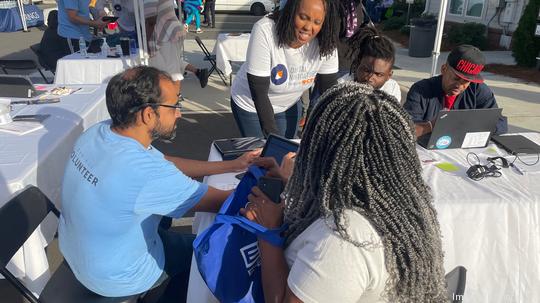
Pat Millen, co-founder and president of E2D, said Charlotte is in a “tremendously” better position in terms of digital equity than the city was almost a decade ago.
“When we started this in 2013, the gap was so wide that we couldn't even fathom a solution. I mean a solution where everyone would ultimately become connected,” he said. “Now, over 10 years and with the advent of the Center for Digital Equity, we now have a game plan where we're adding this area with devices as well as with connectivity and digital scaling. Charlotte is no more than a year away from probably being the most connected city of our size in the entire country.”
Millen said he believes if people do not have access to a computer, individuals will struggle to be successful in the coming years.
“Everyone in Charlotte needs to have an unrestricted computer in their home,” he added. “We ought to be, in a year from now, in a position to say if you live in this economy and you don't have access to a computer, we'll get you one.”
Why Barings invested in the initiative
Barings has been a national investor and lender in affordable housing for over 25 years. The company works with sponsors, syndicators, housing agencies, cities and counties who focus on building homes catered to low- to moderate- income families, said Daron Tubian, head of affordable-housing investments at Barings.
He said in the last two to three years, Barings has considerably increased its financing activities to support the development of more affordable and mixed-income housing units in Charlotte. That’s largely due to the 2019 launching of CHOIF, in which Barings became one of the first companies to contribute to the initiative.
"Our commitment to CHOIF and to housing in Charlotte in general is an essential component of our multifamily investments strategy," Tubian said.
The company also started its social impact initiative in 2019. The program’s three areas of focus are enhancing workforce development, affordable housing and homelessness, and education and financial opportunity, said Elizabeth Cooper, head of social impact at Barings.
The company’s idea to support the laptop distribution initiative was a result of that cause and its support of CHOIF.
“Barings has been around for a while, but I wouldn't say we really had a formalized community engagement strategy until then (the social impact launch),” Cooper said. “We focus in on three key areas but operate underneath the mission of advancing economic and social mobility for underserved and marginalized community members. It's also really allowed us to emphasize a lot of engagement opportunities with our employees and with our partners and connect our employees to our partners, ultimately increasing the impact being made in our community.”
Caldwell said she believes Charlotte has done its due diligence to end the digital divide here, but the mission isn’t over yet.
“There is still more work to do, but I do believe that we, along with the city and the county and others, are doing a really great job of trying to make sure our families stay connected,” she said. “So, I think that Charlotte has answered the call, and we just need to continue to move forward and make bold moves such as this for us to be able to really dig in and move the needle when it comes to economic mobility."
